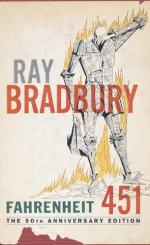|
This section contains 1,319 words (approx. 5 pages at 300 words per page) |

|
"Fahrenheit 451": The Dangers of Utopia
Summary: Creating a "utopia" in "Fahrenheit 451" requires the government to take away citizens' rights and freedoms to created the "perfect" society. Ray Bradybury's science-fiction classic parallels the "bookless" society envisioned by the Nazis.
Imagine a society where books are burned into ashes, a world where people do not have time to make love with their partners and a cruel society where people have no rights or freedom to express their thoughts about their past or future. The government of the society lie to its people about books and manipulate them into believe that the books are the only source of unhappiness and destruction within the society. The concept presented in Fahrenheit 451 verifies that such a reality exists within our society. World War II inspired the author, Ray Bradbury to write a utopia novel, Fahrenheit 451. Prior to the tragic events causing the Second World War II, Nazi developed the bookless society, and the Jews rebelled against Nazi, and people lost themselves in new technology. Similarly, in the novel, the author shows how government misleads its people by replacing family love with technology...
|
This section contains 1,319 words (approx. 5 pages at 300 words per page) |

|


